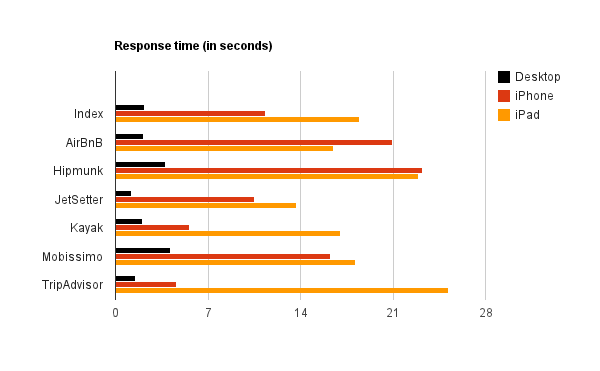Here’s the scenario: You’ve arrived at the airport only to discover that the airline canceled your flight and — oops — forgot to notify you.
[aditude-amp id="flyingcarpet" targeting='{"env":"staging","page_type":"article","post_id":403571,"post_type":"story","post_chan":"none","tags":null,"ai":false,"category":"none","all_categories":"business,","session":"A"}']But when you pull up a travel site on your phone to book a new reservation, it takes ages for the site to load.
That experience is all too common, according to Keynote Systems, whose Startup Shootout Index profiles the speed and responsiveness of web sites for various startups. This month, Keynote’s index found that in the travel category, there’s often a big discrepancy between how fast a site is on the desktop and how fast it is on an iPhone or iPad.
AI Weekly
The must-read newsletter for AI and Big Data industry written by Khari Johnson, Kyle Wiggers, and Seth Colaner.
Included with VentureBeat Insider and VentureBeat VIP memberships.
For instance, Kayak and TripAdvisor both have very snappy desktop and iPhone websites, loading their respective home pages in just a few seconds. But their tablet sites lag way behind, with 17- and 25-second response times, respectively.
“For a traveler on the go, 17 and 25 seconds can seem like an eternity and lead to a lot of frustration,” said Tim Murphy, a marketing manager at Keynote Systems.
Keynote Systems‘ Startup Shootout Index provides some insight into the three-screen challenge now facing anyone with a web presence. It’s the first website performance index to measure load times and completion percentages on desktops, smartphones, and tablets simultaneously.
Check out the full complement of startup speed tests in six different categories below.
To do the test, Keynote used its network of PCs to simulate desktop web traffic to selected startup websites from a variety of locations around the U.S. Additionally, Keynote simulated traffic from iPhone 4 and iPad 2 users in four locations: Chicago, Dallas, New York, and San Francisco. Tests were done over a period of weeks and the results averaged into scores for each website. In addition, Keynote created an index score for each category, which represents the average of all the websites in that category.
VentureBeat is Keynote’s exclusive media partner, so we’ll be bringing you a fresh set of data from Keynote every month. And lest you think we don’t take this stuff seriously, we asked Keynote to add our own homepage to its tests, so we’re now listed in its desktop news site index as well as its smartphone news site index. As you can see, we have a lot of room for improvement ourselves.
[aditude-amp id="medium1" targeting='{"env":"staging","page_type":"article","post_id":403571,"post_type":"story","post_chan":"none","tags":null,"ai":false,"category":"none","all_categories":"business,","session":"A"}']
Note that the test measures home page response times, not the time to complete a transaction or do other activities on these sites. It’s an important measure of responsiveness and has a significant impact on these startups’ brands. Keep that in mind the next time you’re trying to load a website on your iPhone.
VentureBeat's mission is to be a digital town square for technical decision-makers to gain knowledge about transformative enterprise technology and transact. Learn More

